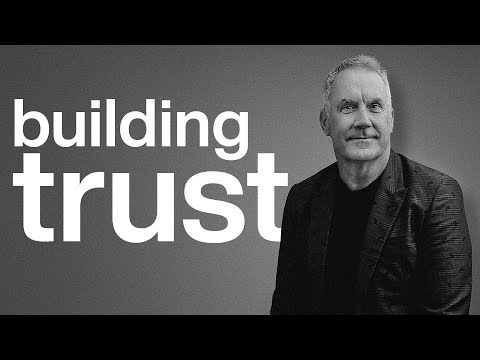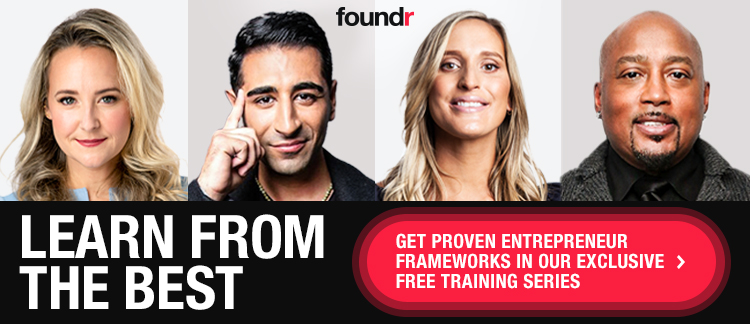The genesis, slow build, and now daily reality of the ups and downs, twists and turns, fits and stops, beauty and brutality of being a now full-time founder began 10 years ago for me.
I had just finished an intense Executive MBA program while working full time and began what would prove to be a deeply formative doctoral program. Balancing the realities of a demanding job and a young family (4 children under the age of 12), I had two goals. First, complete the program in 3 years before turning 40 (I crossed that finish line with 6 days to spare). The second goal was to choose a research topic that I could continue to explore well beyond the graduation ceremony (I’m grateful to still be exploring with no finish line in sight).
The topic that captured my attention, countless hours of research and the willingness to grind through a 230-page dissertation focused on how customer loyalty and value are shaped by specific, structural, and measurable components of trust.
The Building Blocks of Organizational Trust
The framework I used to process my research data, developed originally in the early 2000s by three marketing researchers (Singh, Sirdeshmukh, and Sabol), showed that customer loyalty is driven by a strong value proposition, that is dependent first and foremost on a foundation of trust.
More specifically, the researchers identified the three critical components of trust that, if absent, begin to erode vital performance indicators in any organization.
I refer to these critical components as the Building Blocks of Trust:
- Building Block #1 – Competency: an individual’s or organization’s knowledge, skills, attitudes and behaviors that are causally related to superior job performance (Project Management Institute).
- Building Block #2 – Problem Solving: the process by which individuals attempt to overcome difficulties, achieve plans that move them from a starting situation to a desired goal, or reach conclusions through the use of higher mental functions, such as reasoning and creative thinking (APA Dictionary of Psychology).
- Building Block #3 – Care for Others: looking out for the comprehensive needs of others…also known as organizational benevolence.
Don’t Skip: The Ultimate Guide To Creating The Perfect Founding Team
The Problems of Organizational Trust
Equipped with this framework, I continued my post-doctoral research by meeting for lunch or coffee with dozens and dozens of leaders in various industries and found two consistent problems.
Problem #1: Gut Over Measurability
The leaders I met with couldn’t easily quantify or make tangible the reality of distrust that they were sensing in their organization. I found that, to a person, leaders were quick to assess their current level of trustworthiness by their gut instinct and how they “felt” about things.
But when pressed further on whether or not they formally assessed trustworthiness as a standalone key performance indicator, time and time again, the answer was no.
Problem #2: Destructive Habits
Every leader shared the challenges of the day-to-day destructive dynamics of distrust.
Cynicism, micro-management, quiet quitting, miscommunication, fierce protection of the status quo, declining loyalty, weak advocacy, high turnover, low productivity, promotions without raises, whisper-level conversations, office bullies, email + more email + still more email, identities wrapped up in job titles, not being heard, an employee of the month initiative that backfires and devalues everyone else, satisfaction surveys with no follow up, pervasive distraction, lack of motivation, the absence of developmental pathways, uncertainty about job security, poor training and coaching, meeting after meeting after meeting.
Trustless work cultures are:
- Troubling.
- Heavy.
- Complex.
- Damaging.
- Ulcer-inducing.
Trustless work cultures are toxic work cultures.
A Business Case for Trust
These conversations fueled me to dive deeper into the realm of organizational trust.
A significant turning point in my founder’s journey occurred when I was invited by Kurt Bartolich, Founder of BrandCertain, to co-author The National Survey on Brand and Trust.
Because of how the survey data was structured, the data revealed clear, specific, and prioritized ways to build trust (as well as things to avoid that break down trust) in the areas of competency, problem solving, and care for others. The survey was deployed so that the data could be a driver toward organizational health. We built it so the data would be actionable…not just interesting.
When we got the data back from the 1800 nationwide participants, representing every industry, it became clear to us the sobering truth about the current workplace: organizational trust is in trouble.
– Over half of employees (51%) surveyed don’t have a high level of trust for their leaders.
– When surveying the attitudes of employees who have a high level of trust in their leaders compared to employees who have a low level of trust for their leaders, both employee loyalty and employee willingness to refer the company to others drop by 66%.
– Trust is the priority over revenue/profits, brand, culture, and social responsibility. However, individual contributors and those without a role in organizational strategy, employee engagement, culture, or policy change, are more likely to say that money is the priority.
– Half of the employees, two-thirds in medium-sized organizations, indicated they aren’t likely to work as hard when they don’t trust their leaders. Three in five leaders feel the same way.
– The number one reason why a leader is considered incompetent by employees is because organizations do not have the right people in the right place doing the right things.
– The number one way trust is breached in the building block of problem solving is because leaders don’t seem to understand why something is a problem.
– The building block of care for others suffers the most when active listening is not present.
– Leaders rated their own level of trustworthiness 31% higher than how employees with no leadership responsibilities rated leader trustworthiness in their organization. This gap in trust is where the seeds of toxicity in an organization take root.
The data also showed us that trust can (and must) be a key pathway to flourishing for leaders and organizations when there are intentional, pragmatic, focused, measured, and ongoing efforts that take action towards strengthening the building blocks of trust (competency, problem solving, care for others).
Five Ways to Strengthen Organizational Trust
When trust improves, so too does employee advocacy, retention, productivity, and loyalty. We discovered five top priorities that organizations need to continually be committed to in order to strengthen organizational trust:
- Regular employee feedback (that is actionable)
- Clear ownership of tasks and projects (that matter to the mission of the organization)
- More honest conversations (guided by active listening)
- More transparency (which doesn’t mean divulging every detail)
- Developing and taking action on a clear strategy for building trust in people, policies, procedures, and pricing (and then measuring progress)
Trust at its core is relational and the need for it to be intentionally strengthened is vital, whether you are the founder of a brand new company or a leader of a multi-billion dollar corporation. The company I founded, TrustCentric Consulting, helps leaders and teams assess and take action on strengthening organizational trust. We have found that taking action on trust requires leaders and organizations to courageously and objectively define reality and move forward together, making trust priority #1 instead relegating it to the fun committee and treating it as priority #4 (the thing that is always on the list but never gets done).
Trust is defined as the firm belief in the truth of something and is foundational to who we are as individuals and how we win the loyalty of those we work with and the people we serve. The topic of trust is simple in theory, but far more complex in day-to-day reality. Trust is complex because it’s relational, highly personal, and oftentimes people are unclear on the truth that is to be pursued by the team or the organization.
Keep Learning: The Importance of Teamwork (As Proven by Data)
Build a Trusted Business
The strengthening of trust begins with introspection and self-reflection. Here are some questions to ask of yourself and your team to strengthen organizational trust:
- What are the specific ways our people, policies, and practices need to become more competent (technical, communication, leadership, project management, creativity, etc)?
- What changes do we need to make in our process of identifying the most important problems and collectively solving them?
- How can we demonstrate a deeper commitment to comprehensively care for the needs (physical, social, psychological, vocational, etc) of employees?
- Of the 5 trust priorities listed above, what do we need to be focused on over the next six months in order to strengthen organizational trust? How will we measure our progress?
Trust doesn’t have to be elusive, squishy, and unclear. It can be dimensionalized, measured and acted upon.
Every individual and organization has the choice to either settle for the current workplace cultural reality or take action on strengthening trust. What will your choice be?
The post How to Strengthen Organizational Trust in Meaningful and Measurable Ways appeared first on Foundr.




